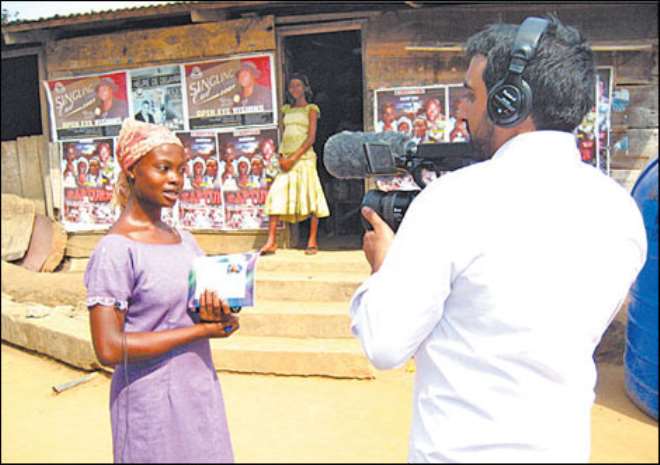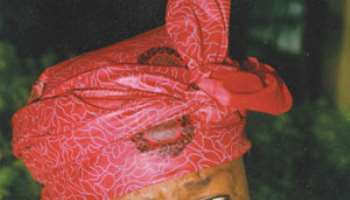Nollywood comes of age
'Nollywood Babylon'
You might be waiting a long time for the bus to leave, but the surest sign that you are finally and definitely on your way is when the driver flicks the switch for the latest Nigerian film and turns the volume up. The bus bumps over potholes, vendors try to push hard-boiled eggs through the window, and the air-conditioning drips dirty water. But these distractions mean little to passengers entranced by the movie unfolding on the television screen at the front of the bus.
I have watched dozens of Nollywood movies – as Nigerian films are known – on public transport in nearby Ghana. Overly long, they often have trite plots and shuddering camerawork that grates on anyone used to slick production and a thumping soundtrack. But half an hour into each journey, I find myself hooked. I have been living in a very different culture and these bus-journey screenings offered an eclectic insight into the world around me.
EDITOR'S CHOICE
So, what did I glean from titles such as Sharon Stone in Abuja, Beyonce: The President's Daughter, Good Mother and Blood Billionaires 1 and 2? (Most titles have at least one sequel). A lot.
Good girls can lose their way in Lagos, village values trump city truths, corruption is rife, witchcraft is everywhere, and stepmothers are bad news. And every man in Lagos, as one character told his wife, has a mistress. These films were peopled by poor village women, business men in Mercedes and hardy entrepreneurs.
Few, if any, were made in a studio. This clearly wasn't Hollywood. But nor did they resemble the one-dimensional images of Africa presented on the news bulletins. These were tales of love, money and betrayal. Buried within these at times fantastic stories were, I thought as the passengers around me laughed and groaned in recognition, African realities.
This week, some of those African realities will be on screen in London. Nollywood Now, the UK's first festival of Nigerian popular cinema, is being held in New Cross.
This is slightly belated recognition of the world's second-largest film industry. In 2006 Nigeria made 872 films (in video format, with about half of them in English), about 200 less than Bollywood and roughly 400 more than Hollywood.
Nigerian films took off in the early 1990s, helped by the availability of cheap video technology. Already massive in Africa, Nollywood is now gaining a reputation elsewhere, says Phoenix Fry, Nollywood Now's creative director. Later in October, the British Film Institute at London's Southbank will dedicate a day to Nigerian cinema. This wave of interest coincides with the 50th anniversary of Nigerian independence, but also reflects an improvement in quality as directors invest more in production. (Budgets are typically small – one film-maker told me they average $20,000.)
Tunde Kelani, whose Yoruba-language film Arugba is on at Nollywood Now, is “spending money on cinematography and sound and the film looks great on screen”, says Fry. “When you have films that look good on a cinema screen, that is when you start getting taken seriously.”
Already, some directors are teaming up with US producers to create more professional productions, said Alfred Soroh, a director at Nollywood Movies, the Sky Nollywood channel. “Nollywood is known for quantity rather than quality. There will eventually be a few of better quality,” he said. “You can already see that change.”
On launch night, Nollywood novices get a primer to the industry – Nollywood Babylon, a documentary aired at the Sundance film festival. The five feature films on show include Osuofia in London, a popular comedy and Dangerous Twins, where Ramsey Nouah plays a double role as twin brothers. The quieter twin persuades his louder Lagos-based brother to go to London, pretend to be him, and get his British wife pregnant.
The brash populism of such Nollywood fare sits in sharp contrast with movies from Francophone Africa. The latter, frequently backed by French funding, often secure critical success, and get an outing at Fespaco, the continent's premier film festival held every two years in Ouagadougou.
Nollywood films rarely secure Fespaco praise. But nor is this an industry reliant on subsidies: although plagued by piracy, it remains popular, independent and accessible. In a continent with few cinemas, an ever-changing selection of video CDs are sold for a few dollars a pop on street corners.
Nollywood “reflects what is going on in society, they [the movies] tell you what is happening from a Nigerian perspective,” says Owoladi Lawal, a Nigerian who works in London.
These movies feed an appetite to see your own realities reflected on screen, not those of an American housewife or a Wall Street businessman. Does a lack of critical recognition matter? Not to the people making the 10-hour bus journey from Accra to Tamale.
Latest News
-
 "If You're For Me, I Am For You" - Cubana Chief P
"If You're For Me, I Am For You" - Cubana Chief P -
 "3 Days To Go" - Femi Adebayo Urges Fans To Get S
"3 Days To Go" - Femi Adebayo Urges Fans To Get S -
 "Stop Asking Me Questions About Speed Darlington"
"Stop Asking Me Questions About Speed Darlington" -
 "Benue Is The Most Underdeveloped State I've Ever
"Benue Is The Most Underdeveloped State I've Ever -
 Stan Alieke Urges Young Professionals To Take Lin
Stan Alieke Urges Young Professionals To Take Lin -
 Chizzy Alichi Teases Fans With Baby Reveal, Promot
Chizzy Alichi Teases Fans With Baby Reveal, Promot -
 "I'm Not Wearing Makeup From July 4th Till Decemb
"I'm Not Wearing Makeup From July 4th Till Decemb -
 "Stop The Challenge Of Mocking Kids With Down Syn
"Stop The Challenge Of Mocking Kids With Down Syn -
 Regina Daniels Celebrates Sons As They Mark Birthd
Regina Daniels Celebrates Sons As They Mark Birthd -
 Speed Darlington Threatens To Sue NAPTIP For Defam
Speed Darlington Threatens To Sue NAPTIP For Defam














